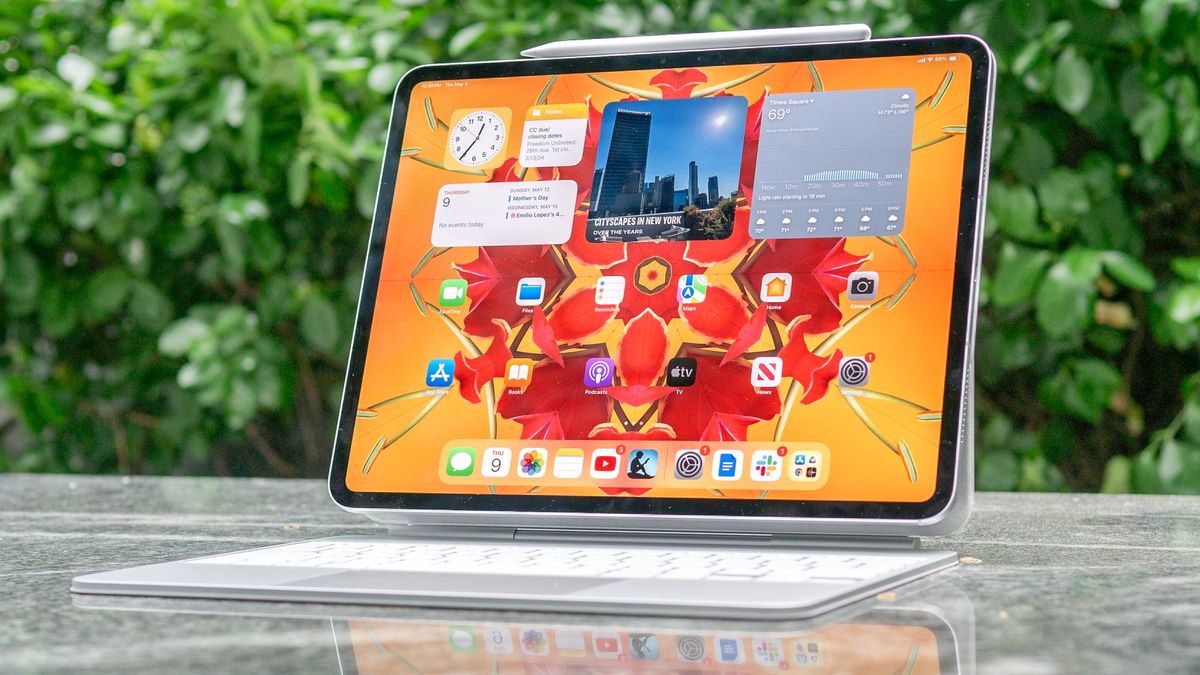These factors should theoretically make the new iPad Pro a decent laptop replacement. But after a week of using (or rather, trying to use) Apple’s powerful slate as a laptop, I can tell you the best MacBooks don’t have to worry about the iPad Pro making them obsolete. Far from it.
The iPad Pro is a fantastic tablet, but it’s still not close to delivering a true laptop experience. I’ll explain why below.
iPadOS isn’t great for productivity
(Image credit: Tom’s Guide)
In my humble opinion, iPadOS 17 smokes its main competitor, Android 14 , in terms of overall useability. To use a refrain familiar to Apple users, iPadOS just works! This operating system is the main reason I prefer iPads to the best Android tablets . But despite its virtues, iPadOS can’t compete with macOS on Macs.
As our own Mark Spoonauer wrote, the iPad Pro 2024 is proof that Apple needs to blow up iPadOS and start over . iPadOS was originally designed for content consumption, and it still excels at that. Watching videos or reading on an iPad is a great experience. However, trying to do basic work on an iPad Pro (or any iPad) is cumbersome at best and frustrating at worst.
I use Google and its various apps for both work and personal use. On a Mac or Windows laptop, I can have Google applications like Drive, Docs, Calendar and so on all in a single browser window containing tabs for those apps. That’s not possible on iPadOS as each of those programs is a discrete app you need to download. Switching back and forth between these apps on an iPad isn’t as efficient as on a browser. The apps also have different layouts than their desktop counterparts, which makes using them less intuitive.
(Image credit: Future)
What about Stage Manager? This iPadOS feature puts the app you’re using front and center and pushes up to four other open apps off to the left-hand side. This is meant to not only help you focus on the app you’re currently using, but make it easier to access other apps. Unfortunately, you have to turn Stage Manger off to use Split View to see apps side by side — which defeats the purpose of using Stage Manager.
I’ve had many conversations with friends and colleagues regarding how Apple should consider putting macOS on iPads — specifically tablets featuring an M-series chip. That would certainly eliminate the problems I have using iPadOS for productivity. However, it could be confusing to have two different operating systems on one machine, and potentially make the iPad less of a tablet and more of a 2-in-1 Mac. I’m not sure if this is the answer, but it’s something I can’t help thinking about whenever the subject of iPads as laptop replacements comes up.
A MacBook Air is cheaper
(Image credit: Tom’s Guide)
The other reason the iPad Pro 2024 isn’t a good laptop replacement is price.
The 11-inch iPad Pro starts at $999 while the 13-inch model begins at $1,299. And this is before tossing in the Magic Keyboard, which costs $299 or $349, depending on the iPad Pro’s size. If you really want to use the iPad Pro as a laptop, then the Magic Keyboard isn’t optional, but essential.
At a minimum, you’ll have to spend $1,298 to get the 11-inch iPad Pro with the Magic Keyboard. But let’s be honest, trying to use the equivalent of an 11-inch laptop won’t make for a comfortable experience. Because of that, you’ll want the 13-inch iPad Pro. Buying that tablet along with its Magic Keyboard will set you back $1,648!
Let’s compare those prices to some MacBooks. Right now, the 13-inch MacBook Air M2 starts at $999. If you want to upgrade to 16GB of RAM (which I’d personally recommend), the cost jumps to $1,199. Even at that price, an upgraded MacBook Air M2 costs less than a 13-inch iPad Pro with Magic Keyboard.
And in case you were wondering, the new 13-inch MacBook Air M3 starts at $1,099. If you configure it with 16GB of RAM for an extra $200, it will still cost less than a 13-inch iPad Pro with Magic Keyboard. Heck, even the MacBook Pro 14-inch M3 ($1,599) has a lower starting price.
Bottom line
For all its strengths, the iPad Pro still doesn’t make a great laptop replacement. Not only is iPadOS not good for laptop-like productivity, but you can get a real laptop like the MacBook Air M2 for hundreds of dollars less.
We might reach a point when the iPad Pro becomes a legitimate laptop replacement. Every new iPad Pro iteration seems to be inching closer toward that potential. But until iPadOS becomes more productivity-friendly (or Apple ditches it for a touch-screen-friendly version of macOS), the iPad Pro won’t replace your laptop.
More from Tom’s Guide 
